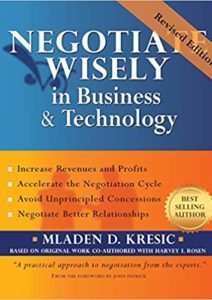Principles That Every Expert Sales Negotiator Should Know
Salling involves a lot of negotiation. It’s an important part of creating a win-win scenario for both the buyer and seller, so that both parties walk away having accomplished their goal, with a shared amount of sacrifice. There are six principles that every expert sales negotiator should know and understand. Understanding and using these principles can give salespeople and sales teams the edge they need to close more deals and make more customers happy. Mladen Kresic, interviewed by John Golden, discusses the six top principles for sales negotiators.
This expert sales interview discusses:
- The six principles for sales negotiation
- Three reasons why sales is a continuous process
Six Principles for Sales Negotiation:
- The most important principle for being an excellent sales negotiator is preparation. “Preparation is the key to winning your negotiations,” said Kresic. It all starts with getting MORE: Motivations, Objectives, Requirements, and Edge. Motivation is why someone does something; Objectives are what they are trying to achieve; Requirements are how we get to the objective; and Edge is getting the advantage in the negotiation by understanding the motivations, objectives, and requirements. Having M.O.R.E. preparation is the key to winning a negotiation.
- The second principle is to protect our weaknesses and utilizing our buyer’s weaknesses. “It’s all about leverage,” said Kresic. In B2B sales in particular, protecting our weaknesses means that we must deal with, and overcome the things that we’re not as strong at – especially if it’s something competitors might excel at.
- Thirdly, ensure that your sales team is unified. Selling as a team can be a huge asset or an unfortunate drawback. There are a lot of teams that end up losing credibility because they operate in a divided way. In order to move your buyer through the sales process, and negotiate successfully, it requires that each person understands how their individual goals work together for the good of the entire team.
- Never make an unprincipled concession. A principled negotiation should take place, for both sides. Otherwise, it paints a poor, unethical picture of the seller, and creates an unsatisfactory outcome for both parties.
- The fifth principle stresses the importance of understanding how negotiation is a continuous process. There are three reasons for this, that are explained in detail below.
- Finally, terms cost money, and someone must pay the tab.
Negotiation is a Continuous Process: Preconceived Notions
There are a number of reasons why negotiations are a continuous process, but three main reasons stand out. The first is that negotiations are pervasive, especially in B2B selling. Buyers typically have a preconceived notion about what negotiations are with a particular company, or the individuals that represent the company. These notions are formed before the seller even enters the room; the ideas have already been set. The reality of negotiations is that it’s all about trying to make your customers better and help them solve their problems.
Negotiation is a Continuous Process: Early Interactions
A second reason is that when salespeople initially interact with their clients and other businesses, they don’t believe they are negotiating. It’s early in the process, they’re prospecting, they’re asking questions about the buyer, and doing general information gathering. But in reality, they’re setting the stage for everything that’s going to happen later on in the sales process when they really are making tangible negotiations. “Many people make mistakes early on in the negotiation process when they don’t actually think they’re negotiating, which causes all kinds of problems down the line,” said Kresic. As you work your way through the sales process, you are constantly negotiating, even just to get to the next step in the process. If you don’t do this, you incur value leakage, which is when a salesperson is overly excited about moving to the next stage and doesn’t ask for anything in return from the client. This is a huge missed opportunity for the salesperson and results in the customer being less invested in the negotiation process as a whole.
Negotiation is a Continuous Process: Incumbent Buyers
The third area where the concept of it being a continuous process has to do with incumbent buyers: the people and companies that you have already sold to. “In selling, the easiest business deals that we should be able to make are to the people we have already sold to,” said Kresic. “When we’re incumbent in doing business with someone, it should be easy to close the sale, and yet very often, it’s not. We don’t manage incumbency as an asset.”
For more information on how to become an expert sales negotiator, watch the full expert sales interview!
About our Host:
John is the Amazon bestselling author of Winning the Battle for Sales: Lessons on Closing Every Deal from the World’s Greatest Military Victories and Social Upheaval: How to Win at Social Selling. A globally acknowledged Sales & Marketing thought leader, speaker, and strategist. He is CSMO at Pipeliner CRM. In his spare time, John is an avid Martial Artist.







Comments